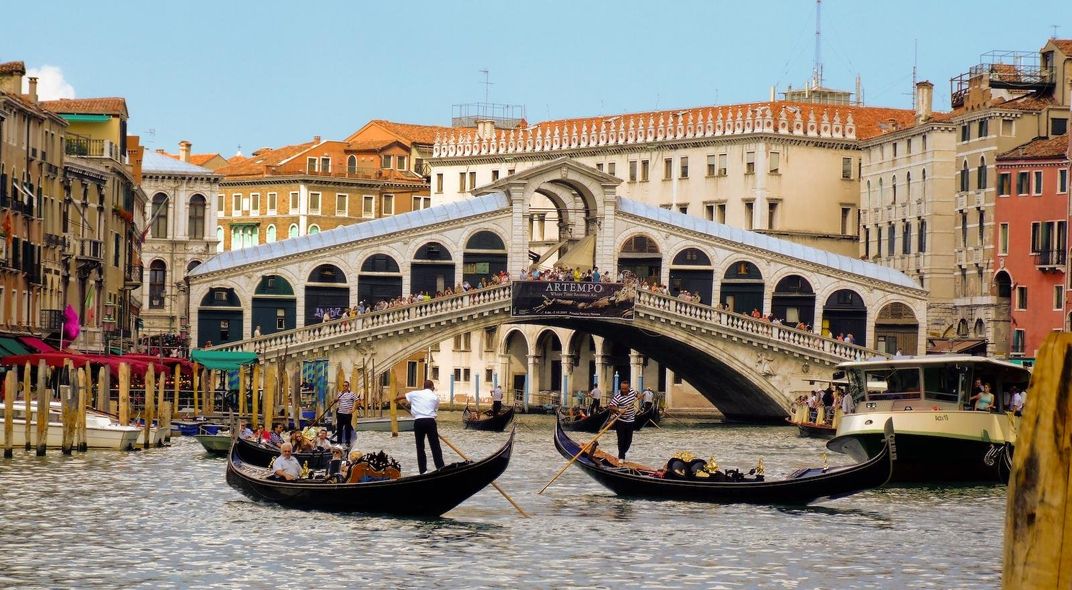Starting Next Summer, Day-Trippers Will Have to Pay to Enter Venice
To combat overcrowding, the Italian city is set to charge non-overnight visitors an entry fee of €3 to €10
:focal(1628x871:1629x872)/https://tf-cmsv2-smithsonianmag-media.s3.amazonaws.com/filer/fa/b4/fab4fa0c-9526-4bd4-8c49-0e8de8c1305a/gettyimages-1323197529.jpg)
Venice has a mass tourism problem.
Earlier this month, as some countries lifted Covid-19 restrictions and international travel slowly picked up steam, the Italian city welcomed up to 80,000 visitors each day, reports CNN Travel’s Julia Buckley. According to local newspaper Il Gazzettino, tourists outnumbered Venice’s 50,000 residents by more than 50 percent.
To curb this onslaught of visitors, Italian officials have announced plans to charge entrance fees and require advance booking for would-be day-trippers, reports Laura Berlinghieri for La Stampa.
Lawmakers approved the new measures this week. But plans to tax visitors to Venice have been in the works for years, notes Philip Willan for the London Times.
Authorities delayed instituting an entry fee during the Covid-19 pandemic, when the city’s trademark canals, elegant footbridges and towering St. Mark’s Basilica briefly stood empty. Beginning next summer, however, day visitors will need to book tickets in advance and pay a fee of €3 to €10 (about $3.50 to $11.80). Costs will vary depending on the season and the anticipated number of tourists on any given day.
As Alessandro Speciale reports for Bloomberg, the extra cost will not apply to people who book stays in local hotels, children under 6 years old, or city residents and their relatives. Ticketed visitors will need to enter Venice’s historic sector through turnstiles—a move that has drawn criticism from some locals.
“This is the consecration of Venice as a theme park with access subject to the payment of a ticket,” city council member and lawyer Marco Gasparinetti tells La Stampa, per a translation by Forbes’ Laurie Werner. “It is humiliating for the city, for its residents and for visitors.”

In an op-ed for the Telegraph, Buckley points out that overnight visitors to Venice already pay a tax of up to €5 a night (around $5.90). These longer-term tourists tend to contribute more to the local economy than day-trippers, who often bring their own food and drink and take pictures outside rather than purchasing entry to the city’s museums, churches and other attractions.
Large crowds attracted by cheap flights and the 1,600-year-old city’s famed canals and architecture have wreaked havoc on Venice by polluting and overcrowding central areas. Last week, CNN Travel reported that Venice’s public transit system has resorted to hiring security guards to control unruly crowds. Though employees are not required to carry their weapons, many licensed guards opt to do so.
Constant throngs of tourists make the seaside city a difficult place to live. Venice’s historic center has lost half of its population in the past four decades, eroding the city’s social fabric and its local economy, as Anna Momigliano reported for the New York Times in July.
Cruise ships have presented a separate, but related problem, for Venetian locals, as they allow tourists to descend on the city’s historic sites en masse for short periods of time. (Day-trippers, including cruise ship passengers, constitute 73 percent of visitors to Venice but just 18 percent of the tourism economy, per the Times.) Unesco has long warned that ships of this size pose an environmental threat to the city’s fragile lagoon ecosystem.
In late July, Italy took a major step by banning large cruise ships from Venice’s waters, as Gaia Pianigiani and Emma Bubola reported separately for the New York Times. The ban, which took effect on August 1, impacts ships weighing more than 25,000 tons or measuring longer than about 590 feet.
“The intervention could no longer be delayed,” said Italy’s culture minister, Dario Franceschini, in a statement quoted by the New York Times.
/https://tf-cmsv2-smithsonianmag-media.s3.amazonaws.com/accounts/headshot/nora.png)
/https://tf-cmsv2-smithsonianmag-media.s3.amazonaws.com/accounts/headshot/nora.png)